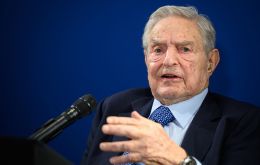MercoPress. South Atlantic News Agency
International
-
Saturday, May 23rd 2020 - 09:49 UTC
Restrictions on Chinese air carriers flying to US unless there is reciprocity

The US government on Friday accused the Chinese government of making it impossible for US airlines to resume service to China and ordered four Chinese air carriers to file flight schedules with the US government. The administration of President Donald Trump stopped short of imposing restrictions on Chinese air carriers but said talks with China had failed to produce an agreement.
-
Saturday, May 23rd 2020 - 09:47 UTC
Hertz Global files for bankruptcy protection as Covid-19 vanishes business

The more than a century old car rental firm Hertz Global Holdings filed for bankruptcy protection on Friday after its business all but vanished during the coronavirus pandemic and talks with creditors failed to result in needed relief.
-
Saturday, May 23rd 2020 - 09:25 UTC
Pakistani Airbus with 99 passengers crashes in Karachi district: at least 80 killed

A Pakistan International Airlines Airbus jet with 99 people aboard crashed into a crowded residential district of the city of Karachi on Friday afternoon after twice trying to land at the airport, a witness said.
-
Saturday, May 23rd 2020 - 09:20 UTC
Soros warns EU survival threatened unless it issues perpetual bonds to prop weak members

George Soros, the billionaire financier, has cautioned that the European Union's survival was threatened by the novel coronavirus unless it could issue perpetual bonds or “consols” to help weak members such as Italy.
-
Friday, May 22nd 2020 - 08:58 UTC
Argentine negotiations with creditors deadline extended to June 2

The Argentine Ministry of Economy extended until June 2 the term to renegotiate the US$ 67 billion of debt securities issued under foreign law, with the aim of continuing negotiations with creditors.
-
Friday, May 22nd 2020 - 08:41 UTC
Oil prices slump after China omits 2020 economic growth target

Oil prices slumped on Friday after China's decision to omit an economic growth target for 2020 renewed concerns that the fallout from the coronavirus pandemic will continue to depress fuel demand in the world's second-largest oil user.
-
Friday, May 22nd 2020 - 08:37 UTC
IMF optimistic Argentina and creditors can reach an agreement

The International Monetary Fund expressed optimism that Argentina can reach an agreement with private creditors “to establish a sustainable path in the future” when the government of President Alberto Fernandez formally extended the deadline term to reach an understanding on the US$ 67 billion debt.
-
Friday, May 22nd 2020 - 08:20 UTC
Falkland Islands commemorates Landing Day, 38 years ago, in San Carlos

The Falkland Islands commemorated on Thursday Landing Day, 38 years ago when British Forces took several beaches in San Carlos settlement beginning the recovery of Islands territory.
-
Friday, May 22nd 2020 - 07:35 UTC
Globally Covid-19 cases exceed 5 million and 330,000 deaths, WHO report

Globally, confirmed cases of coronavirus on Thursday exceeded 5 million, while in the last 24 hours there was a world record of infections in one day, 106,000, according to the World Health Organization (WHO) and the database from Johns Hopkins University.
-
Friday, May 22nd 2020 - 07:30 UTC
With lockdown, unaccompanied young migrants crossing the Channel to Britain on boats instead of trucks

The number of unaccompanied young migrants crossing the Channel from France to Britain has spiked during the coronavirus outbreak, as travel restrictions force them onto boats rather than trucks.
